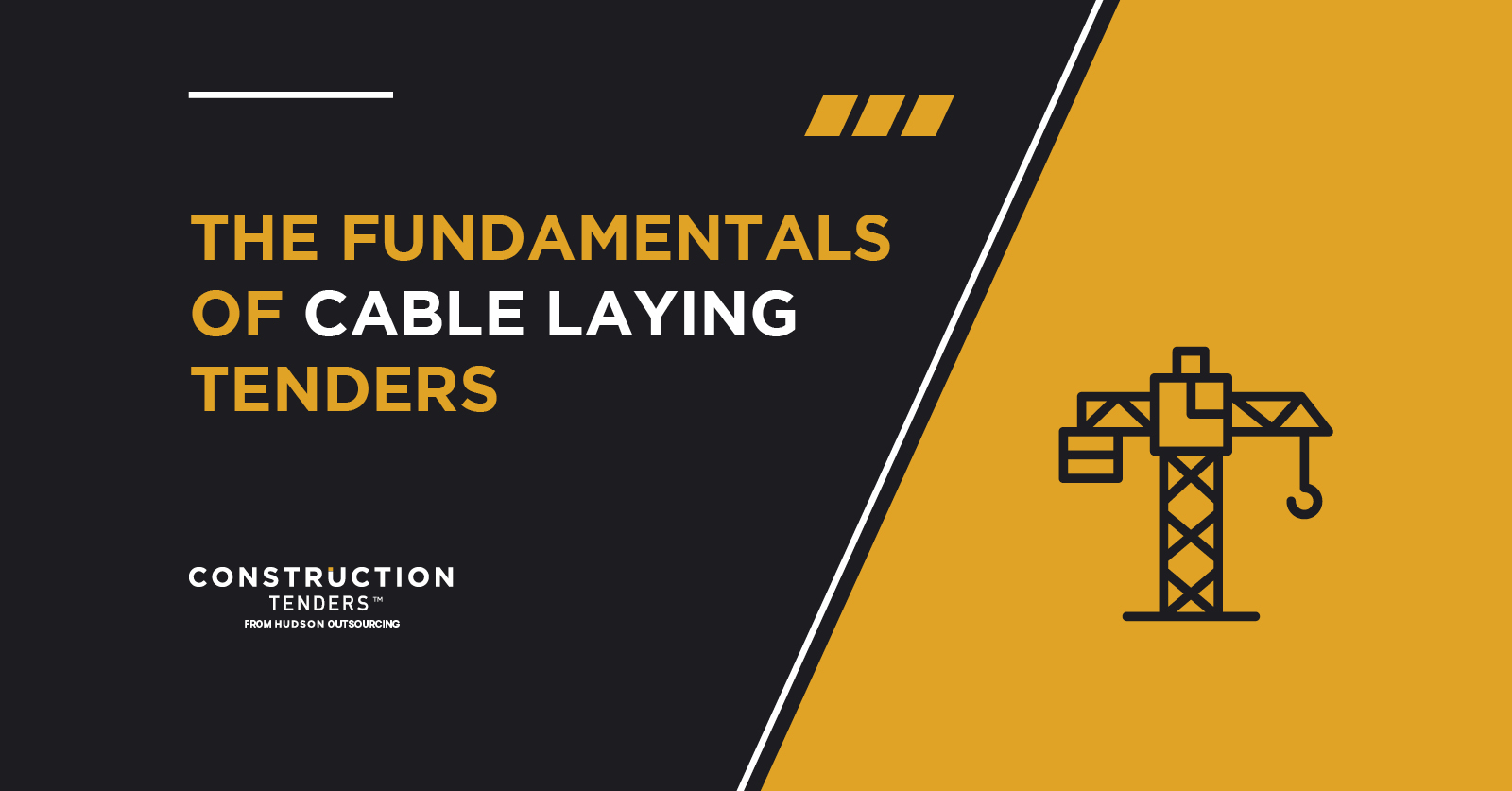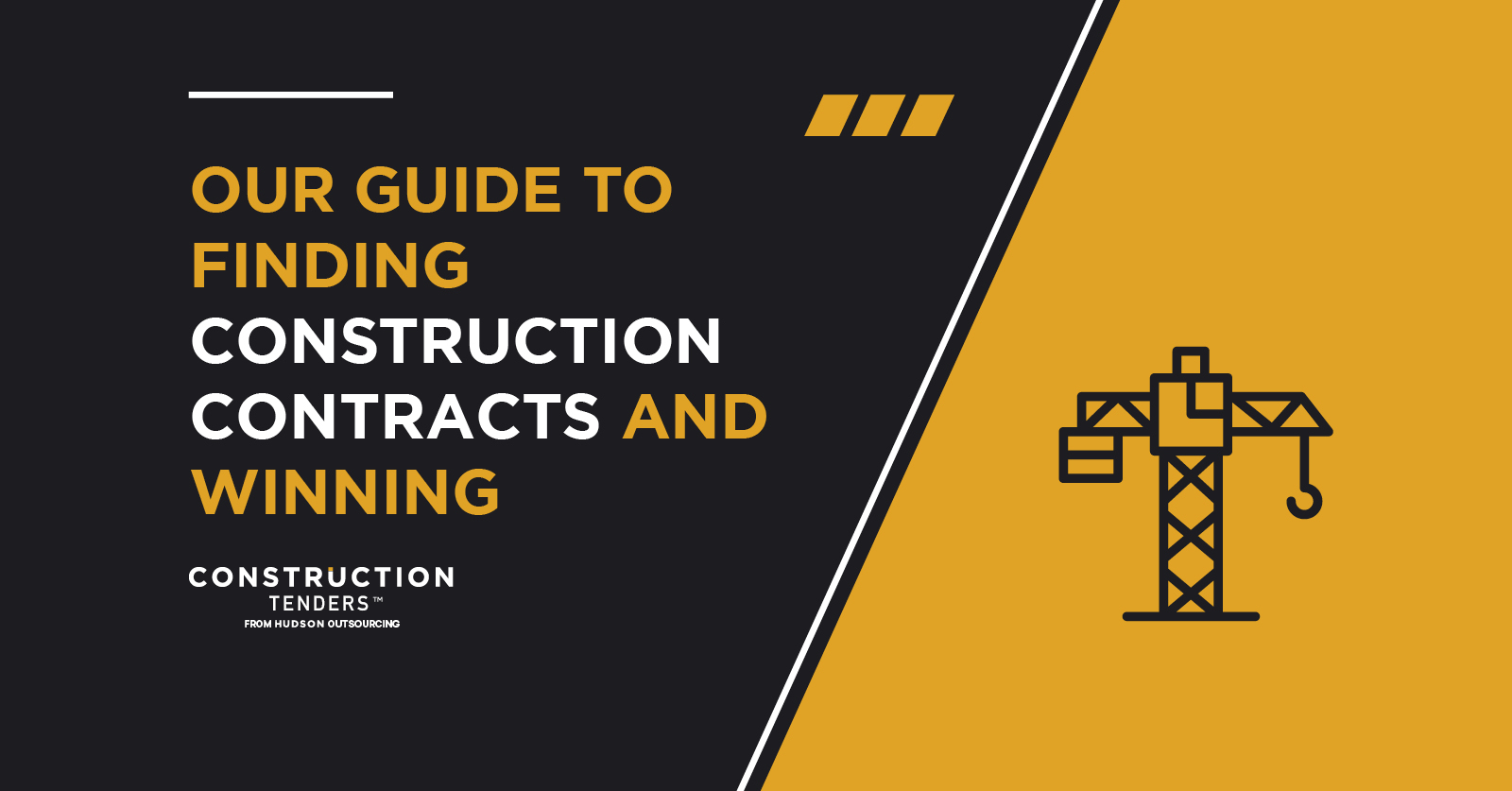What to expect when bidding for construction contracts in the UK
Construction contracts in the UK are constantly being put out to tender. That’s thanks to the billions of pounds that are invested in the construction industry across the UK. The UK government is focused on building the country out of the COVID-19 pandemic.
Recently more businesses are turning toward tendering as a viable and lucrative way to grow their business. COVID-19 has changed the way many companies do business. Tendering is a contact-free way of growing your business, and you can do it from home. This has led to increased competition, so it’s best to be prepared when writing your response. You want to stand out from the crowd and persuade the buyer that you’re the best company for the job.
7 things you can expect to find in a PAS91 or PQQ for construction contracts in the UK
Below are seven things you can expect to complete when bidding for of construction contracts in the UK. They can often be found within the pre-qualification questionnaire (PQQ) and PAS91 in construction. Below highlights the main areas that will be covered and what questions you can expect to answer. It is predominantly a box-ticking exercise to make sure you pass the minimum criteria for the work at hand.
-
Supplier identity and contact information
-
- Accounts and financial statements
- Insurance statements and certificates.
-
Business and professional standing
- Any criminal convictions.
-
Health and safety
- Health and Safety management policies
- How you obtain health and safety advice
- Health and safety workforce training
- Workforce health and safety qualifications
- RIDDOR
- Health and safety implementation
- Risk assessment
- Suitable workforce welfare facilities
- Arrangements for co-operation and or-ordination with suppliers and sub-contractors.
- CDM co-ordinators and designers.
-
- Compliance with anti-discrimination legislation.
- Any findings of unlawful discrimination.
- How your company ensures equality and diversity within your organisation.
- Actively promote good practice by eliminating discrimination.
-
Environmental management policy and capability
- Policy and management of construction-related environmental issues.
- Arrangements to ensure your environmental management procedures effectively reduce and prevent significant impacts on the environment.
- Check, review and improve your environmental management performance.
-
Quality management
- Policy and organisation for quality management.
- Procedures to periodically review correct and improve quality performance.
Once you have passed the PQQ or PAS91 stage, you’ll be given an ITT. ITT stands for an invitation to tender and is the next round of the tendering procedure.
3 things you should include in an ITT for construction contracts in the UK
-
Relevant accreditations and qualifications
Construction tenders will ask for proof of your business and employee’s relevant qualifications and accreditations. Construction sites can be hazardous environments, leaving plenty of opportunities for accidents to arise.
You should demonstrate your business is prepared, in keeping with relevant health and safety regulations and best practice. A buyer may ask what relevant accreditations and qualifications you have, asking you to attach proof to your tender documents. These could include, but aren’t limited to, the following:
- OHSAS 18001:2007
- CHAS
- RIDDOR
- ISO 9001; 14001; 18001; 45001:2018
- CDM 2015
- Constructionline
- Subcontractor
- SSIP
- BIM
- IOSH.
-
Evidence of your professional capability
Carrying on from relevant accreditations and qualifications, you will need to demonstrate and evidence your professional capability. You can expect to be asked to provide up to three relevant case studies completed within the last five years.
They should be contracts you have completed similar in complexity and scope to the current contract. Positive testimonials from past clients are a bonus. They can help you assert yourself to the buyer of the quality of your services.
Preparing a selection of previous examples of your work can help strengthen your bid. Having a well-prepared bank of evidence can help save time with future submissions too.
When applying for construction contracts in the UK, it’s a good idea to prepare any:
- CCS reports.
- National awards and nominations.
- Fully completed risk assessments and method statements.
- Site audits and completed reports.
- Before, during and after photos from previous contracts.
- The contact information and testimonials from previous satisfied clients.
-
Social value
The updated government Construction Playbook has an emphasis on practising sustainable construction to the best of one’s ability. Public sector construction tenders in the UK have a mandatory minimum weighting of 10% on social value. Buyers want to see how your business will give back during the course of the contract.
Social value has an emphasis on the economic, social and environmental aspects within the community and across the UK. Your sustainable development goals should maximise social values such as:
- COVID-19 recovery.
- Environmental considerations such as reducing waste and encouraging recycling, practising sustainable construction.
- Promoting and creating new skills and jobs, tackling unemployment.
- The equal opportunity and diversity policies you implement.
How to win government construction contracts in the UK
Over the years, construction has continued to be the largest public sector expenditure by volume and value. Almost 16% of UK construction spend is by the public sector. Budgets bids for government construction contracts are vast, meaning there is an opportunity for business of all sizes. There are several reasons for this. The UK government is keen to encourage Small, Medium Enterprises into government supply chains in order to improve value for money within the public sector.
Although tendering for government construction contracts is highly regulated, the advantage is that no matter how small your business, there is always an opportunity to supply the government. Their remit extends across all major areas of the UK construction sector.
Additionally, the government has to be transparent in the way they are spending public money. This means there are no grey areas during both the tendering process and any time spent under contract.
Aim to be the most economically advantageous tender
To evaluate bids for construction contracts in the UK, nearly every tender will be evaluated through the same method. This is known as ‘MEAT‘ and it stands for: Most Economically Advantageous Tender.
What this means, is the client is looking for a contractor who can provide the best value throughout their bid. Therefore, this gives the best chance of delivering a successful project.
It is important you don’t misunderstand what this means for your bid. Being economically advantageous does not necessarily mean ‘cheapest’.
Do not make the mistake of deliberately pricing low-cost bids in an effort to win. This will result in you risking two outcomes:
- You may end up completing the project at a loss, meaning you lose money instead of making it!
- Annoying your clients by either failing to meet quality standards or having to request additional funding later on or, at worst – breaking contract and/or getting thrown off-site!
Instead, you should write your bid to demonstrate clearly and concisely how you will deliver an outstanding service to the client:
- Completing the construction to meet the client’s specifications.
- Provide a quality construction team who can safely deliver the works.
- Provide added value to the construction works.
Let’s break this down…
1. Meeting specifications
When bid writing for a construction sector tender you should clearly demonstrate how you will deliver the required works:
- Show the client you know how to will meet the needs of the works.
- Give examples of your track record achieving similar specifications.
- Provide references and testimonials for each example where possible.
2. Provide a quality construction team who can safely deliver the works.
Demonstrate in your bid that the team delivering these works have the capability and experience to guarantee a successful project. This can include:
- CVs
- Summary introductions to team members
- Provision of qualification documents
- Examples of previous projects
- Examples of track record working together with the Client and or contract partners
The key point to remember is you need to provide confidence to the client that your team know what they’re doing and will deliver the project successfully
As part of your bid, you may be invited to interview before the award stage. This is a chance to introduce key people to the client and let them showcase their expertise, providing confidence in them, and your bid.
3. Provide added value to the construction works
This is an important (and often forgotten) part of your bid. Writing about how you can provide added value to the construction contract is a big part of being economically advantageous. What you can offer will vary from bid to bid, but examples of what it can include are:
- Planning works to minimise project costs e.g. ordering materials in bulk to save cost and well before they’re needed to prevent delays.
- Reducing (or removing altogether) waste from your site by repurposing it. E.g. turning waste wood into outside seating for a local benefactor.
- Investment in the Client’s customers e.g. employing local people or subcontractors to deliver the works?
- Upskilling the communities where you work with work placements/skills workshops etc.
- Increasing quality of life for local residents by providing free to access events and resources. Examples of this include coffee mornings for local elderly residents, hosting soup kitchens for rough sleepers or donations to local food banks.
Types of UK government construction contracts
Typical with most government construction contracts, opportunities are subject to a legal framework, in the interests of promoting fair, transparent competition and value for money. Contract opportunities can come in the form of:
Standard, direct, winner-takes-all construction contracts
One supplier will be appointed to deliver the specification. An example of such a government construction contract currently available to tender is:
- Contract Title: South Ferriby, Skinners Lane Car Park Resurfacing
- Buyer: North Lincolnshire Council
- Contract Length: 2 months
- Value: £10,000
Framework agreements
Multiple approved suppliers are utilised, often on an ad-hoc, call-off basis. An example of a government construction framework currently out to tender is:
- Contract Title: London and Quadrant Housing Trust – Paving Products Framework 2020 – 2024
- Buyer: L&Q Construction
- Contract Length: 4 years
- Value: £6,000,000
Dynamic purchasing systems (DPS)
With extended deadlines, you can apply at any time. Workstreams follow similar to that of framework agreements. An example of a current government construction DPS out to tender is:
- DPS Title: DPS for the Supply, Delivery and Maintenance of Leakage and Data Logging Equipment
- Buyer: NI Water and its Subsidiaries
- Contract Length: Ongoing until 2028
- Value: £5,000,000
Regardless of its form, opportunities can substantially increase turnover and profits, allowing your business to develop further.
Getting involved in HS2
Getting involved in public sector construction can reap awards, as this sector often represents numerous high-value contract lots. Perhaps the most well-known ongoing opportunity for the procurement of government construction contracts is HS2. HS2, or High Speed 2, is a landmark project proposed by the government, which began in 2009. The project involves the design and construction of brand-new high-speed railway tracks and stations. They will connect Leeds, Manchester, Birmingham and London. HS2 is the biggest project of its kind in Europe and continues to provide numerous opportunities to secure government construction contracts.
Despite the issues and rather significant financial stumbles surrounding HS2, the project will be running long-term. As of 11 February, prime minister Boris Johnson has confirmed that the full project will be followed through. Getting on board could very well be profitable for your business.
Here’s why:
- HS2 contract opportunities are in full supply for large businesses and SMEs alike. HS2 place particular focus on making project work more accessible for small or medium-sized enterprises. This is a unique opportunity to build contract experience on a national, government framework. This can typically be challenging and inaccessible for SMEs.
- The tier system HS2 ltd uses for procurement means a fairer opportunity to tender for projects. Bidders can apply as a Tier 1 direct supplier for high-value opportunities. Contractors who gain work as a Tier 1 contractor are required to advertise relevant supply chain opportunities, which benefits SMEs. This amounts to thousands of government construction contract supply chain opportunities.
- HS2 contract experience will be invaluable for demonstrating experience in future tenders. Showing a clear commitment to UK infrastructure.
What the Construction Playbook means for construction contracts in the UK
Construction contracts in the UK can be lucrative, with some public sector contracts sitting comfortably in the millions. The government launched a new Construction Playbook in December 2020 that detailed 14 key policy reforms.
Their focus is to enable a faster, better and greener construction industry. It details how construction contracts in the UK are assessed, procured and delivered within the public sector.
The 14 key policy reforms are:
- Commercial pipelines
- Market health and capability assessments
- Portfolios and longer term contracting
- Harmonise, digitise and rationalise demand
- Further embed digital technologies contracting
- Early supply chain involvement
- Outcome based approach
- Benchmarking and Should Cost Models
- Delivery model assessments
- Effective contracting
- Risk allocation
- Payment mechanism and pricing approach
- Assessing the economic and financial standing of suppliers
- Resolution planning.
The following subsections highlight some key things to consider when bidding for construction contracts.
SMEs and the supply chain
SMEs have an important part to play within government construction contracts in the UK. The government understands the considerable contribution that SMEs make to the construction industry. They are central to product development and innovation within the construction sector. The Playbook encourages an environment where smaller, innovative and newer businesses thrive.
This is further implemented with the government’s pledge of spending £1 in £3 with SMEs by 2022. This pledge means they are actively encouraging and awarding public sector construction contracts in the UK to smaller businesses.
Increase the use of Modern Methods of Construction (MMC)
MMCs should transform how public works projects are delivered. This could be done via digital technologies and the UK BIM (Building Information Management) Framework.
The Construction Playbook gives insight into how the government wants to improve the consistency and quality of data within construction. The use of such technologies hopes to transform how projects and programmes can be delivered within the public sector by:
- Improving safety
- Enabling innovation
- Reducing costs
- Supporting more sustainable outcomes
The Playbook recommends that all contracting authorities and suppliers should apply to the UK BIM Framework. This framework includes guidance, standards and other resources that can deliver government soft landings.
The adoption of the UK BIM Framework aims to support the Information Management Framework. This is a common framework of protocols and standards. They hope this will enable and encourage a secure and resilient data sharing network.
Effective contracting
One of the key policy reforms is that of Effective Contracting. This is designed to ensure that construction contracts in the UK are structured to support an exchange of data. It also hopes to enable collaborations, improve value and manage risks with clear expectations. Continuous improvement and consistency can be expected and are highlighted within the Construction Playbook.
Commercial frameworks
Commercial frameworks are used frequently within construction contracts in the UK. They’ve been proven to provide a platform for strategic planning, integrated teams encouraging continuous improvement. Commercial frameworks are one way to deliver faster, safer, greener and therefore better project outcomes.
The frameworks are used in both the public and private sectors. However, they often lack clear guidance as to their best practice features and preferred structure. Due to this, frameworks are not always successful in delivering their aims. The use of frameworks inappropriately can have negative consequences for contracting authorities, market, suppliers and result in unintentionally inflating prices. This is an area that is to be reviewed by Lord Agnew. Lord Agnew is conducting an objective and independent review of public sector frameworks.
The Framework Review hopes to lead recommendations for:
- The component of a ‘gold standard’ that new proposed frameworks and framework contacts can be measured.
- Standard construction contract terms that support the new gold standard.
- Training packages that enable the adoption of the new gold standard.
Hopefully, this will lead to the adoption and use of suitable framework structures used within construction contracts in the UK. Such structures are essential in order to enable the deliverance of the policies set out in the Construction Playbook.
Standardised terms and contracting
Standardised construction contracts in the UK can be used to help simplify and speed up procurement procedures. Through the use of a common approach used across the public sector, best practice is more easily embedded. The Construction Playbook states that standard construction contracts with appropriate options should be selected where possible. You can expect public sector organisations to select standard contracts from the following suites:
- JCT 2016, as published by the Joint Contracts Tribunal.
- NEC 3 or NEC 4, as published by the Institution of Civil Engineers.
- PPC2000/TAC-1 and FAC-1 as published by the Association of Consultant Architects.
Innovation
Innovation is a key theme throughout the Construction Playbook and the government are encouraging it in every way. It’s something worth considering when applying for government construction contracts in the UK. Contracting authorities are always considering how they can improve their approach to innovation. If you demonstrate this within your tender response, you’re almost guaranteed to score points. If your business uses or processes any new technology, you should include it within your response.
However, innovation doesn’t just come in the form of technology, innovative thinking is also awarded. You should consider research and innovation-based procedures that go beyond engagement and suggest novel solutions. This may seem excessive for a simple construction contract, but the government loves to see it.
Promoting social value
Social value is incredibly important to all public sector tender responses. Since the beginning of January 2021, it has had a mandatory rating of 10% within government contracts. It doesn’t matter what industry you’re in, they want to see how your business gives back. Often, they look for how you are going to:
- Help local communities recover from COVID-19.
- Encourage employment opportunities.
- Develop skills.
- Improve environmental sustainability.
This helps level the playing field within public procurement and should be considered for any construction contract in the UK.
Assessing economic and financial standing
The government hopes to safeguard the delivery of public sector projects and programmes. They do this by assessing potential suppliers economic and financial standing during the selection process. The key principles that are used for financial testing are:
- To determine a bidder’s financial capacity to perform the contract.
- One part of the overall judgement of sustainability during selection.
- They should have transparent, objective and non-discriminatory methodologies for assessment.
- All potential suppliers should be tested fairly.
- All bidders who score anything other than ‘low risk’ should be given the opportunity to provide additional and acceptable evidence.
- Bidders with scores other than ‘low risk’ may be able to proceed subject to additional risk mitigations.
How to choose the best construction bid site for your business
Using the best construction bid sites is a vital step in finding relevant tenders and growing your business.
You might be wondering, what is tendering? And why is it important to the construction sector? You’re not alone – many construction businesses miss out on construction leads simply by not utilising the tendering process. In short, tendering is the most common way in which a buyer finds the most appropriate supplier for goods or services. Including tendering in your business strategy allows you to secure contracts from buyers you may never have connected with otherwise. This is invaluable when it comes to growing your business sustainably.
If you’re new to tendering, finding the best construction bid site can seem like a daunting task. What exactly should you be looking out for, anyway? When you search ‘best construction bid sites’ in Google, the results can be overwhelming. Plenty of sites will provide you with reams of opportunities from countless buyers. Job done! Right? Not quite.
You’ll often find yourself wading through tenders with requirements that don’t suit your business in the slightest. Finding a construction bid site with tenders that are specific to your business can become a stressful and fruitless process. Unless you know exactly where to look!
What to look for in construction bid sites
What should you be looking out for to find the best construction bid site for your business? We’ve created a quick and comprehensive guide so you can rest assured that you’re looking in the right place:
Here are the top 7 things you should look for to find the best construction bid site and secure relevant contracts:
-
The portal doesn’t rely on CPV codes
There’s a fundamental problem with the way most construction bid sites source tenders for businesses – CPV codes.
CPV stands for Common Procurement Vocabulary. A CPV code is an 8-digit code which allows buyers to classify what they are procuring in a succinct way. In theory, suppliers should be able to use CPV codes to source perfect business opportunities quickly and effectively.
Sound too easy to you? You’re right. In practice, this doesn’t happen.
Studies show that close to 30% of CPV codes are tagged inaccurately. It’s easy to make a mistake when tagging a tender with a complex 8-digit code. Many buyers also don’t understand the requirements of CPV codes and so they use them incorrectly, or not at all.
So, what does this mean for your business? Well, this is particularly harmful in a sector as varied as construction with such a broad range of sub-sectors. On most construction bid sites, clients are not finding all of the tenders that are relevant to their specific services. Even if you’re searching via relevant CPV codes, you’re missing out on countless contracts that could grow your business.
For example, imagine an Architecture firm registers to a portal that tracks tenders via CPV codes. To use the portal effectively, the firm would need someone in their team with a comprehensive understanding of CPV codes. Even then, up to 30% of the results they come across could be tagged incorrectly. They could end up trawling through tenders for contracts such as the supply of bedding plants or website development services. Obviously, these tenders would be completely irrelevant to the Architecture firm’s services. This ultimately defeats the purpose of a tracking portal which should save you time when sourcing new business opportunities.
-
The portal manually tracks construction contracts
The best way around the shortfalls of CPV codes? Manual keyword tracking.
At Construction Tenders, we don’t rely on CPV codes to source tenders for our clients. Instead, our dedicated team of Opportunity Trackers manually search thousands of sources every day. They read the requirements of every buyer and manually tag each tender with the correct industry-driven keywords. This avoids the problem of sub-sectors being mislabelled with the wrong CPV code. It also eliminates the need for someone in your firm to comprehensively understand CPV codes. We handle all of that for you.
When you sign up to Construction Tenders, you can simply enter the keywords that best describe your services. Search these keywords and you’ll be able to access relevant opportunities instantly. It’s that easy. Every tender you see on our portal is manually tracked, and therefore relevant to the services you offer. No exceptions.
Ultimately, our manual tracking saves you countless hours of searching through irrelevant tenders and gives you instant results.
-
The system focuses on your industry
Most bid sites source tenders for all industries so there’s always a high chance of seeing irrelevant opportunities. You could find plenty of tenders for video production, but this is no good if you’re a roofer.
With Construction Tenders, every opportunity is sector-specific. Our focused approach is the most effective way to provide you with relevant tenders.
Our Opportunity Trackers source specific opportunities for a range sub-sectors, including:
-
It allows for remote working in teams
Remote working has changed the way businesses operate in a lot of ways. Tendering remotely is a lot easier when you have access to a portal that allows you to work in teams.
We’ve designed our tendering portal specifically to make remote working easier. Our portal allows you to give multiple colleagues access to your business account. Each colleague can then assign tasks and add tenders to their favourites page.
- You have access to virtual learning
Great! You’ve found the best construction bid site and, consequently, the perfect contract to bolster your business. You now see that the buyer has asked for a technical and in-depth response. Bids can sometimes require over 10,000 word responses with stringent requirements. Even if you have time to do this – which, let’s be honest, who does? – can you show why you’re irrefutably the best business for the job? Do you know how to write a winning bid?
If not, don’t worry. We’ve created Tender VLE specifically to eliminate the confusion around tendering and procurement. Tender VLE is a free service that gives your business expert advice on the ins and outs of tendering. Through video masterclasses, fact sheets, blogs and templates, you’ll learn how to create a winning tender and secure the best contracts.
-
You can outsource bid writing if needed
Some people just aren’t natural-born writers. A good bid writer can transform the way buyers view your business – and give you exponential results.
We have developed Hudson Succeed, our bid writing division, to carry our clients through the bidding process every step of the way. Our team are exceptional Bid Writers who assist businesses in multiple sectors to write compelling and technical narratives.
With the help of Hudson Succeed, countless construction sector companies have grown their businesses effectively. The team holds an 87% bid success rate and are trusted by over 700 businesses, globally.
They can help get you well on your way to securing your next construction contract. Whether you’ve tendered before, or are brand new to the process, they have a service tailored to every need.
- A Tender Ready
- Tender Writing
- The Tender Improvement
- Tender Mentor
Evaluating methods of finding construction job leads for your business
Finding the best construction job leads for your SME, or as a sole trader, can be tricky. In an ideal world, you’d always be able to find good leads as often and as quickly as you needed. Ideally, the perfect construction job leads would find their own way to you!
In reality, tradespeople and construction SMEs often waste a lot of time searching for construction job leads. Does this sound like you? Maybe you’ve struggled to find relevant construction job leads and worried that you’re looking in the wrong place. Or are you simply waiting for leads to come to you? A surprising percentage of tradesmen (75%!) say word of mouth is their top strategy for finding construction job leads. This strategy looks a lot like waiting around and wasting time, once you know what you could be doing.
How to find construction job leads
Here are three ways to increase the amount of construction job leads you find. We’ve evaluated each method based on how much it can help SMEs and sole traders to grow their businesses.
1. Get construction job leads via a tendering portal
Searching online for construction job leads in your sector will provide you with opportunities. You might find hundreds of construction job leads this way. But, as you probably know, it’s never that simple. Very often, the construction job leads you come across don’t suit your business. Once you’ve looked at the specification, there’s a number of ways a lead might not be right. The contract’s size, budget, location, length, requirements, or sector could all be the wrong fit, for instance. Frustrating, we know.
But tendering portals make finding construction job leads that are sector-specific and relevant to your business easy. So, if you want to save time and resources that could be focused on growing your business – start tendering.
Is tendering worth it?
Absolutely. Not only do you find relevant construction job leads, but you access a wider variety of leads than other methods. Construction Tenders connects you with buyers you couldn’t connect with organically and tenders you never would have found searching yourself.
Especially important for sole traders or SMEs, tendering can secure ongoing work on large construction frameworks. For instance, a relevant roofing contract that’s part of a much larger build can be a stepping-stone for smaller traders. This experience increases the roofing company’s chances of winning larger, more rewarding projects with future construction bids.
You’ll only see new construction job leads that are relevant to you on Construction Tenders. This sets us apart from other portals which rely on inaccurate CPV codes to track opportunities. Ultimately, tendering in this way ensures the best results for your business, and helps you reclaim valuable time.
-
Get construction job leads via referrals
Improving your customer service to get more referrals is an often-touted method of getting more construction job leads. How does it work?
Boost your customer service
- Go above and beyond with your customer service to secure great reviews. Show you care about your work. Ways to improve your customer service include:
- Always be reliable and punctual with work and calls
- Always be polite and professional with customers
- Operate a tidy and organised workspace
Ask for reviews
- Always ask for reviews when a job is complete, so you’ll have testimonials to prove the value of your work. Improving your customer service will make this much more fruitful. You can request reviews on Google My Business by sending an URL to customers after a job is complete. Google also promotes local business by showing them on Google maps results, voice search, and normal searches. For instance, anyone searching for a bricklayer will see local bricklayer business pages at the top of the search results. This is a great place to procure your strongest reviews.
Incentivise referrals
- Incentivise referrals by offering rewards to those who refer you.
Are referrals worth it?
Improving your service will, in turn, generate better reviews and future referrals for your company. Nothing bad will come of improving your services and caring more about your customers. However, this is a slow-burning strategy for finding new construction job leads and depends heavily on others supporting you.
-
Generate construction leads via an online presence
Building your online presence is a popular method of generating construction job leads in the digital age. You can do this in the following ways:
Create a website for your business
- Make sure your construction business’ information is accessible to others at all times. Be sure to include:
- Contact information;
- A personal touch, i.e. images of you and your team, images with clients, if permitted.
- Case studies and high-quality images of past projects that you’re proud of, including before and afters, if possible;
- Testimonials from past clients;
- Your credentials and accreditations.
Set up email marketing for your business
- Set up an email newsletter for customers to get the word out there about your business. You can include the following:
- Reminders of your company and the work you do;
- News and updates on your business;
- Share tips, ideas, and trends that are related to your specialised trade – i.e. DIY projects.
Set up social media pages for your business
- Gone are the days of the yellow pages, and word of mouth simply doesn’t cut it anymore. You can instead boost your online presence through social media.
- Create your own Facebook or Twitter page.
- Engage with potential customers.
- Network with other construction companies who are non-competitors. For example, connect with a roofing company as a bricklaying business and share your customer base.
Is digital marketing worth it?
Creating an online presence for your company can be great for exposure and might score you small and relevant jobs. However, a snazzy website won’t do the legwork for securing work on large projects, frameworks or ongoing jobs. Implementing the above strategies in your company can also be time-consuming and expensive. You’re looking for construction job leads after all, not a career in digital marketing…
So, which strategy generates the best construction job leads?
Overall, referrals and online marketing are both valuable strategies, but they only go so far. They still largely depend on construction job leads finding you. Also, they don’t ensure you find the maximum number of leads possible, nor do they advance you onto bigger projects. Ultimately, this isn’t the best way to grow your company.
So, scrap waiting around for referrals, or website clicks, and don’t waste time searching for construction job leads manually. With the vastness of online results, this can essentially be akin to searching for a needle in a haystack. If you want to grow your business sustainably, rather than depending on reputation or self-marketing, tendering is the best method.
What’s the current climate for construction job leads?
Despite the recent impact of Covid-19 on the construction industry, there is a bounce-back and ongoing investment.
For instance, the government’s Housing Infrastructure Fund Forward Funding (HIF FF) offers some good news to the industry. After surpassing £1.8bn of investment in early November 2020, it will deliver another £1bn of investment in construction, country wide. These investments, delivered by Homes England, will help to deliver up to 300,000 new homes across England. It provides local authorities with funding for new infrastructure and brings new construction jobs leads to offset the pandemic’s impact.
Robert Jenrick, the Housing Secretary, described the scope of the investments:
“In order to build more homes, we need to provide the infrastructure and public services to match. This investment will help to build homes where we need them the most. It also supports existing communities by ensuring they get the new roads, schools and other public services that are needed.”
How do I get started?
If you’re looking for the best construction bid site, Construction Tenders can save you countless time and money that you’d spend manually searching. You’ll instead gain new business opportunities that are specifically relevant to you. Unlike other construction bid sites, we’ve humanised tendering at every level – from manual tracking to account management. This high level of attention to detail secures the best results for your business.
You will receive daily alerts when tenders are released for services in your sector as well as 24-hour access to our Construction Tenders portal. Book a free live demo of the portal today and see how the portal can help your business grow with construction leads. You’ll see all of the current opportunities available and understand how the system will work for your business.
Below are previous construction bids sourced on our portal:
Fender Pile Replacement Works
Fenland District Council- Eastern- Budget: £90,000
Dunnikier Business Units, Kirkcaldy – Steelworks, Roof and Wall Cladding Works Package
Fife Council- Scotland- Budget: Undisclosed
Communal Floor Replacement
Southend-on-Sea Borough Council- Eastern- Budget: Undisclosed
Asbestos Removal Services
Yorkshire and Humber Police Procurement (Y&HPP)- Yorkshire and Humber- Budget: £1,500,000
Roofing Repairs (Framework)
Nottingham City Council- East Midlands- Budget: Undisclosed
We also source construction contracts for services including:
Start a free trial to see how the system can help you find and win more construction contracts in the UK.
Upgrade to our new time-saving tools – Discover Elite
Upgrading to Discover Elite allows you to find tendering opportunities even when you’re busy. Our two new packages can improve your bidding success rate and competitor awareness. Each package can help save you even more time when searching for the right fabrication tenders for your business.
The Ultimate Time Saver package offers your business:
- A maximum of five tender breakdowns per month.
- An annual subscription to a maximum of two Hudson Discover sector-specific portals. This option suits businesses that overlap two industries such as Construction and Facilities, for example.
- Pre-market and award engagement notices monitored on your behalf.
- Buyer portal management, including registration, password management, downloading documents and assessing viability based on your bid or no-bid
- Weekly phone calls with your dedicated Account Manager to discuss viable construction tendering opportunities.
The Become a Pre-Bid Master package offers:
- All of the above.
- Up to seven tender breakdowns per month.
- A Bid Strategy delivered by a Senior Bid Manager with a minimum of 5 years of experience. It will also be managed by our Global Bid Director.
Contact us to find out how we can help your business grow.
Need help writing your next tender?
If you don’t have the resources or time to write a winning bid, why not outsource it? Our sister company, Hudson Succeed, boasts an 87% success rate and has over 60 years of collective bidding experience. They offer four bid writing support packages to help you on the path to success. Whether you’re new to tendering, or simply need someone to proof your written response before you submit – we can help.
Tender Ready
Our Tender Ready programme is designed for those who have never tendered before. This 4-week programme works with you to ensure you have everything in place to tender successfully.
Tender Improvement
Tender Improvement can help if you’re already tendering but aren’t seeing success from your current efforts. Our Bid Writers will assess your previous submissions and supporting documents. They’ll give you feedback and guidance on how to improve, helping you to secure your next structural engineering tender.
Tender Mentor
If you’ve written a tender and need someone to proofread it – Tender Mentor is for you. A Bid Writer will double-check it’s in line with the specification and free of any grammar or spelling mistakes.
Tender Writing
If you’ve found the perfect tender but don’t know where to start – we can help. Send the specification over to us and our Bid Team will do the rest. They’ll let you know what they need from you and provide you with a full breakdown. They’ll even submit it on your behalf, leaving you more time to focus on your business.
Get in touch for more information about our bid management consultancy services.
Check out some of our other blogs:











